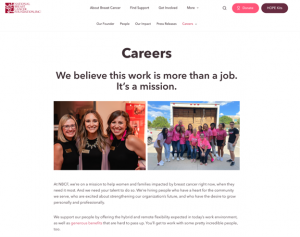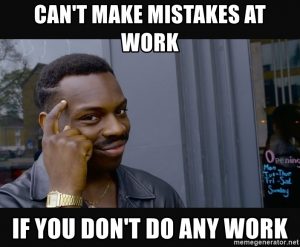For more up to date articles on an effective job search, sign up for Substack: Here
Should your resume writer provide samples? by Krystal Yates
This question frequently arises because common internet advice says you should ask for samples. You need to be able to see what you are getting, right? Our stance is absolutely not. Content is what matters, not the way the resume looks – beyond some best practices. A good-looking sample resume doesn’t mean you will get an effective resume.
Why we don’t provide samples:
As stated above, content is what matters, not the look. We want to get to know you and learn more about your industry, background, and even personality before deciding on a format and style for your resume. Samples aren’t always a good indicator of what your resume is going to look like. And again, strong verbiage and the right content are far more important than the look of the resume. I’ve seen some truly tragic-looking resumes over the years – and still called the applicant because, as a hiring manager, I understand that the best employees aren’t always the best resume writers. As long as I can find the information I’m looking for, the resume is doing its job.
There is no “right” way to write a resume. If you ask ten recruiters and ten hiring managers what the best look, format, style, etc. is, you will get twenty different answers. If you ask their top tips for writing a resume, you will get at least one contradictory piece of advice. When EBR writes resumes, we do it based on you – your background, industry, next job, and even personality to get the look right for you.
Even then, we occasionally don’t get it right on the first try. But that is why we collaborate with our clients. We are the experts on resumes, but you are the expert on you. When we work together, we can do great things.
There are four types of resumes. Until we’ve spent time with you, we won’t know which one makes the most sense.
Chronological is the most common type. If you’ve had a linear, progressive career and are looking for a job equal to your most current one, this could work.
Functional works better for certain industries, specifically when the work is fairly straightforward without much change between jobs. Examples include many medical positions, bookkeeping, basic customer service, and many manual jobs.
The hybrid resume is our favorite based on the demographic we commonly work with. This is the resume type we recommend when a client is changing industries, trying for a promotion, or is in a position where a focus on achievements is important. We find this format works best for most executive resumes as well.
Tailored resumes are the final option, although we don’t do many of them. A tailored resume is targeted to one specific job posting. If you are in an active job search, this doesn’t usually make sense.
We are good at what we do (modest, not so much!), and our clients will back us up on that. We have been named one of the top ten resume writing services in DFW for the last three years running. We are in the top 8 cover letter writers nationally according to the same website and the top ten best military to civilian resume writers. Our results speak for themselves.
If not samples, how do you qualify your resume writer? Reviews are probably one of the best places to start. What other customers think of the writer is a pretty good indication of what your experience will be like. Don’t just look at how many stars the company has, though. Read the reviews to get a solid feel for how the company operates. Google “How to Hire a Resume Writer,” and you’ll find countless articles, all with slightly varying advice. Top Resume says this, while Forbes says this, and LinkedIn says this. We think Mac’s list provides the most comprehensive list of considerations.
Bottom line, how well are you communicating with your resume writer? Do they seem to understand your needs? If so, you can work together to create the right resume.
Start with WHY: the key to building your employer brand
Our guest writer this month is Rachel Kennedy, owner of Southern Lighthouse, an employer branding content agency.
“We’re desperate”

My heart broke when I read the hand-written sign that said, “We’re Desperate” outside of my favorite fried chicken restaurant in Dallas.
Reading the hand-written chalk sign broke my heart, thinking of the hiring struggles happening in so many of our businesses right now.
We are certainly living in a candidate’s market. That means communicating in the way that candidates want to be communicated with. Not out of desperation, but instead out of a place that offers value.
Are you struggling to hire? Do a quick search on Indeed.com for one of your open roles. Type in “Office Manager” and “Dallas, Texas” and see how many job opportunities pop up. The results likely run in the hundreds. This means that your ideal candidate has hundreds of opportunities to choose from, so it is critical to stand out in a positive way.
But how?
Employer branding starts with your Employee Value Proposition, or EVP for short. This is the compelling answer to the question: “Why should I work here instead of somewhere else? What’s in it for me?” Potential employees want to know why they should work for you, when they could work in a comparable role at 389 other companies.
The first step in sharing your EVP is writing and speaking with candidate-centric language. I’ll modify President John F. Kennedy’s famous quote here: “Ask not what your candidate can do for you – share what you can do for your candidate.”
Practically, this means erasing “Apply Now” and “We’re Hiring”, replacing it with what you can offer.
I recently worked with the National Breast Cancer Foundation as they were struggling to fill an executive-level role. Their careers page and job description listed the experience and degree requirements (just like the other 389 job openings on Indeed), but it failed to mention anything about their life-saving mission!
After we worked together, we rewrote their careers page and the first paragraph of the job description to include their WHY: to help and inspire hope in those affected by breast cancer through education, early detection and support services. It became such a powerful, stand-out message! (And they have a high-level quality applicant interviewing now!)

Consider your current job postings: do they speak with candidate-centric language? (Here is what we offer you!) Do you list your benefits? Do you describe your mission?
Next time I return to my beloved fried chicken restaurant (I pray that it is still open!) I would offer this advice: erase the company-centric, anguished language of “Apply Now! We’re Hiring! We’re Desperate!” and instead use candidate-centric, WHY language. “We offer a positive, fun work environment, free meals during shifts, free parking, flexible hours, and free smells.” My fingers are crossed that they enumerate their benefits they offer, and outline their mission to get more amazing team members to join, so I can dig into my fried chicken this weekend.
*************************
As a lover of company culture, Rachel Kennedy believes the most powerful lighthouses shine from within. After 13 years of leading recruitment at The Beck Group and The Container Store, Rachel founded Southern Lighthouse, an employer branding content agency that helps recruiters, marketers and leaders at growing firms strategically attract the right people to their unique cultures through better candidate messaging & content.
Rachel graduated with a Bachelors in Psychology from Austin College, and holds a Masters in Sustainability from Southern Methodist University. Rachel is a mom of two wild boys, cookie lover, wife, and tea aficionado who lives in Dallas, Texas. Connect with Rachel at Rachel@SouthernLighthouse.com.
Concerned About Your Mental Health?

Do you feel you have a lot on your plate and that you cannot keep your head above water? Do you find that balancing your family’s needs, your personal needs and your employer’s needs can be a bit overwhelming? Sometimes we go to work because we love what we do and enjoy using our skills to help our company grow. Sometimes we go to work because it gives us a break from the stresses at home. And, sometimes we go to work and struggle to keep it all together. The demands of our employer, our peers and customers can be pretty intense and if we are struggling with boundaries and self care we can become overwhelmed and frustrated and this could lead to burn out.
Some strategies to help with this are:
Take a lap around the building for a brief 5 minute walk.
Take a deep breath in, hold it and slowly let it out. Breathe out as if you are blowing the fluffy seeds of a dandelion. Do this several times.
Take a break and use that time to listen to your favorite song
Make a list of 10 things you are grateful for today
Take five minutes to focus on things you can touch, things you can see and things hear
Irene Little, PsyD., MS, MA, LMFT-S, LCDC, ICADC, ADCIII, MAC, CCC-SLP
CEO
Access Counseling Group,
4280 Main Street, Ste. 300
Frisco, Texas 75033
972-905-6574 Tel
Thinking about “Quiet Quitting?
 Exactly what is “Quiet Quitting?”
Exactly what is “Quiet Quitting?”
The current definition from Wikipedia says, “Quiet quitting is an informal term for the practice of reducing the amount of effort one devotes to one’s job, such as by stopping the completion of any tasks not explicitly stated in the job description. The term implies that this is done secretly or without notifying one’s boss or manager.”
Please note that a couple of assumptions in this definition make it a little dangerous.
The first assumption is that “the task is not explicitly stated in the job description.” Most job descriptions are worded vaguely enough that many tasks can be implied rather than stated. Most are tasks that would be natural follow-ups to an already completed task, such as a Thank You note to a vendor who went above and beyond to get supplies sent. These follow-ups can’t all be listed in a job description without it becoming a book rather than a document!
The second assumption is “done secretly or without notifying one’s boss or manager.” Unless you work in a sealed vault with no other employees and your manager is deaf and blind – someone will notice.
In a pre-Covid office environment, this sort of “quiet quitting” would be noticed fairly quickly – first by the co-workers and then by the supervisors. Our current hybrid (part-time office, part-time work from home) might take a little longer.
Most often, the “quiet quitter” has decided that their work is not being compensated as it should be, so they only give what they think they’re getting paid for. That’s a sad case and most often results in the quitter leaving the organization – sometimes involuntarily. An alert manager can often interrupt this behavior by offering training, moving to a different department, or helping in overcoming other challenges in a way the employee sees as profitable for them.
We have all seen another version of the “quiet quitter,” and there is at least one in every office. I call this person the “I never got started to begin with.” This person went to work the first day with no intention of setting the world on fire. Their entire purpose is to get a paycheck with the least effort required. In his article “I tried Quiet Quitting before it was cool…” (https://www.marketwatch.com/story/i-tried-quiet-quitting-before-it-was-cool-and-regretted-it-ever-since-11661607277) George Passy compares himself with George Costanza from Seinfeld. Costanza’s entire focus was on NOT working and still getting a paycheck. Can you imagine how hard the other employees had to work to carry old George and do their own work?
How do you deal with a “quiet quitter” or a “loud quitter” (as described here: https://www.gallup.com/workplace/398306/quiet-quitting-real.aspx) without just leaving your current job?
You don’t. Recognizing the symptoms is important, but you are not the cure. The company you work for needs to change its culture. A more proactive training program for anyone who wants to participate, incentives for above and beyond performance, and just plain appreciation for a job well done are important to every employee and can make a big difference to the “quiet quitter.”
If you are a “quiet quitter,” you are in the wrong workplace. You can continue your subliminal protest or do something about your situation. Start by doing some internal searching. What, specifically, got you to where you are? Talk to your manager and try to find a solution. If that isn’t possible, it is time to start looking for a company that better reflects your definition of a good place to work, where you can put your best foot forward without feeling as though you are being underpaid and overworked.
5 Benefits of Career Coaching; How coaching can improve your job search
Have you considered a career coach for your job search but you aren’t sure if it is worth the money? Job searching shouldn’t cost you money after all! A career coach is much like a real estate agent. They aren’t necessary to get the job done, but they sure can make the process easier. A good career coach isn’t an expense, it is an investment in your future.
1. You don’t know what you don’t know.
A good career coach will help you navigate all the advice out there – both good and bad. The job market continues to change. They can help you stay current on your job search knowledge. They can also help you determine what makes the most sense for you, your industry, field, and level of experience and ensure that you’ve considered everything before accepting that job offer.
2. Practice makes perfect
The number one mistake people make in their search is being unprepared. Your coach will make sure that you are prepared going into each step of your search. From creating the right personal brand (resume, LinkedIn, and cover letter) to knowing how to answer interview questions and successfully negotiating your total compensation package.
3. Emotions run high during a job search.
A coach is there to help you work through the process without the emotion you and inevitably your partner will bring to the process. Your coach cares about your success. They will let you work through those emotions, then help you to get to the core of what is holding you back.
4. Coaches have connections
Your coach can help connect you to people in your field – either through personal connections or teaching you the best ways to reach out and connect. Your job search shouldn’t just be about hitting the “easy apply” button. Most people find their next position through their network so if you aren’t reaching out, you are losing out on many opportunities.
5. They will keep you on track
A good coach will act as your accountability. For many, the skills associated with the job search do not come naturally. That makes it easy to find excuses to procrastinate on some of the more difficult parts of the job search. With accountability, you are bound to get to your next position faster.
Coaching covers many aspects of the job search depending on where your needs lie. A good coach will start with making sure you are clear on where you want to land next. From there, they can assist with tips on improving your search process, interview prep, salary negotiations and everything in between.
While investing in your job search can be daunting, especially when you aren’t currently pulling in a paycheck, when done right it is a solid investment. Career coaches will help you navigate an unfamiliar and complicated process creating clarity and peace of mind that you are taking all the right steps.

